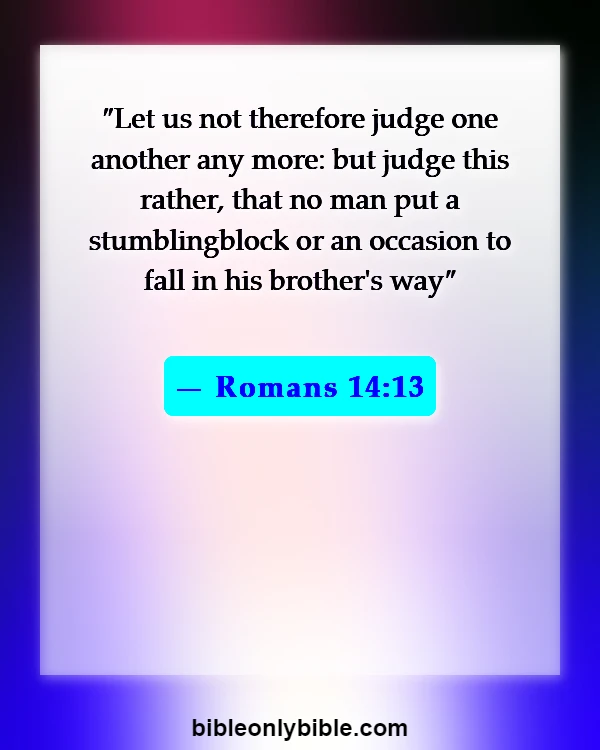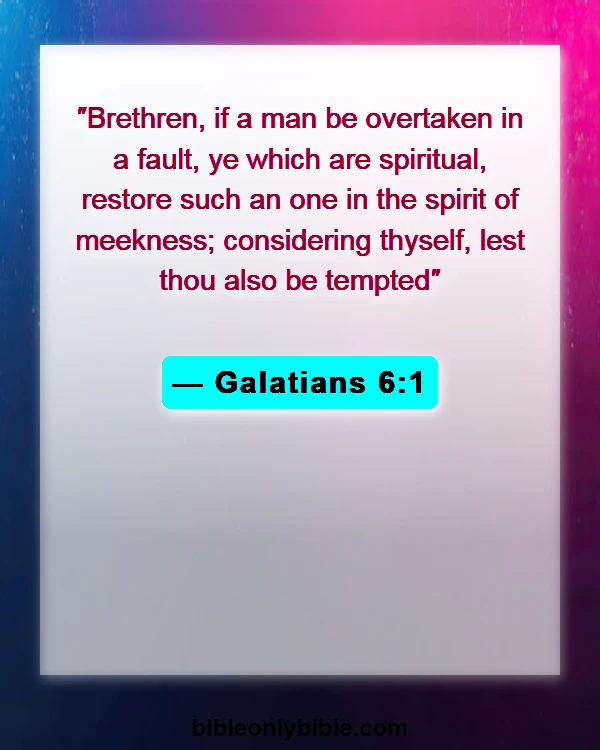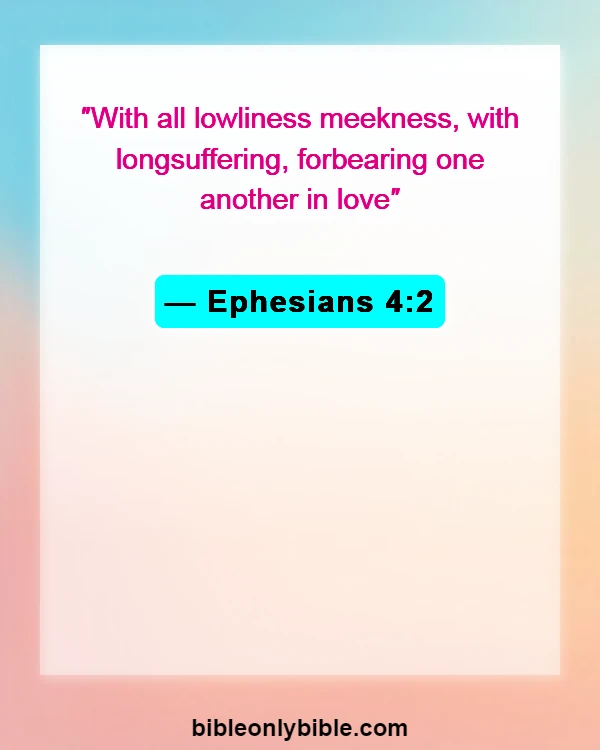Friends, if you’re searching for “Bible Verses About Not Judging,” this content is for you. Today, I share Bible verses that can really help you better understand the concept of not judging others according to the Bible. These scriptures offer guidance on how to approach others with compassion and humility, reminding us to examine our own hearts before passing judgment. Let’s explore what the Word says about refraining from judgment and embracing a more understanding perspective towards our fellow human beings.
Contents
- 1 What Does the Bible Say About Judging Others?
- 2 Matthew 7:1-5 – Remove the Plank from Your Own Eye
- 2.1 Matthew 7:2 – Judgment you give is judgment you receive
- 2.2 Matthew 7:3 – Notice your faults before judging others
- 2.3 Matthew 7:4 – Address your own faults before judging others
- 2.4 Matthew 7:5 – Address your own faults before judging others
- 2.5 Luke 6:41 – Focus on own faults before judging others
- 3 Romans 14:10-13 – Why Do You Judge Your Brother?
- 4 John 8:7 – Let Him Who Is Without Sin Cast the First Stone
- 4.1 John 8:7 – Only the sinless should judge others
- 4.2 John 8:10 – Jesus questions the accusers of the adulterous woman
- 4.3 John 8:11 – Jesus forgives, instructs to sin no more
- 4.4 James 2:13 – Mercy triumphs over judgment
- 4.5 John 8:9 – Accusers left, convicted by their own conscience
- 4.6 John 8:8 – Jesus writes on the ground, emphasizing reflection
- 5 1 Corinthians 4:5 – Judge Nothing Before the Time
- 6 James 4:11-12 – Do Not Speak Evil Against One Another
- 7 The Difference Between Righteous Judgment and Condemnation
- 8 How to Apply Biblical Non-Judgment in Daily Life
- 8.1 Colossians 3:12 – Clothe yourself with compassion, kindness, humility, gentleness
- 8.2 Ephesians 4:2 – Humility, gentleness, patience, bearing with love
- 8.3 Philippians 2:3 – Humility: Value others above yourselves
- 8.4 1 Peter 3:8 – Live harmoniously with compassion and humility
- 8.5 Romans 12:10 – Honor others with genuine love and devotion
- 8.6 1 Thessalonians 5:11 – Encourage and build each other up
What Does the Bible Say About Judging Others?
Judging others is something we all do from time to time, sometimes without even realizing it. The Bible reminds us that judgment is best left to God, as only He sees the full picture. We are encouraged to approach others with compassion and understanding, recognizing that we all have our own struggles and shortcomings. By focusing on love and empathy, we can foster a more supportive and forgiving community.
Matthew 7:1 – Do not judge, to avoid being judged

Judge not, that ye be not judged
Matthew 7:1
Explanation:- This verse teaches the importance of refraining from judging others to avoid being judged ourselves. It encourages self-reflection and compassion, reminding us to be mindful of our own faults before criticizing others, fostering a more understanding and empathetic community.
Luke 6:37 – Do not judge, and you will not be judged

Judge not, ye shall not be judged: condemn not, ye shall not be condemned: forgive, ye shall be forgiven
Luke 6:37
Explanation:- This verse emphasizes the importance of refraining from judgment to avoid being judged ourselves. It encourages compassion and understanding, highlighting the value of forgiveness and mercy in our interactions with others, fostering a more harmonious and empathetic community.
Romans 2:1 – Judgment condemns yourself; practice what you preach

Therefore thou art inexcusable, O man, whosoever thou art that judgest: for wherein thou judgest another, thou condemnest thyself; for thou that judgest doest the same things
Romans 2:1
Explanation:- This verse highlights that when you judge others, you condemn yourself, as you often practice the same behaviors. It serves as a reminder to focus on self-reflection and humility, urging individuals to practice what they preach and avoid hypocrisy.
James 4:12 – God is the only lawgiver and judge

There is one lawgiver, who is able to save to destroy: who art thou that judgest another?
James 4:12
Explanation:- This verse highlights that God alone possesses the authority to judge and establish laws, reminding us that we should refrain from judging others. It calls for humility and recognition of our limited understanding compared to God’s perfect wisdom and justice.
John 7:24 – Judge righteously, not by appearances

Judge not according to the appearance, but judge righteous judgment
John 7:24
Explanation:- This verse highlights the importance of discerning beyond superficial appearances. It urges us to exercise fair and thoughtful judgment, reflecting on deeper truths rather than making hasty assessments based on what is immediately visible. This encourages a compassionate and just approach to understanding others.
Matthew 7:1-5 – Remove the Plank from Your Own Eye
This passage teaches us the importance of self-awareness before passing judgment on others. It’s easy to see the faults in someone else, but often we overlook our own. By focusing on our own growth and imperfections, we become more understanding and less critical of others. It’s about humility and recognition that we, too, are a work in progress.
Matthew 7:2 – Judgment you give is judgment you receive

For with what judgment ye judge, ye shall be judged: with what measure ye mete, it shall be measured to you again
Matthew 7:2
Explanation:- This verse teaches that the way we judge others is how we will be judged in return. It encourages self-reflection and humility, reminding us to address our own shortcomings before criticizing others. This principle fosters compassion and understanding in our interactions with others.
Matthew 7:3 – Notice your faults before judging others
Why beholdest thou the mote that is in thy brother’s eye, but considerest not the beam that is in thine own eye?
Matthew 7:3
Explanation:- This verse encourages self-reflection before passing judgment on others. It highlights the importance of recognizing and addressing our own flaws and shortcomings. By focusing on our personal growth, we become more compassionate and understanding when interacting with others.
Matthew 7:4 – Address your own faults before judging others

Or how wilt thou say to thy brother, Let me pull out the mote out of thine eye; , behold, a beam is in thine own eye?
Matthew 7:4
Explanation:- This verse highlights the importance of self-reflection and humility. Before criticizing others, we should first acknowledge and address our own shortcomings. By doing so, we cultivate a more compassionate and understanding attitude, aligning ourselves with the teachings of empathy and personal growth.
Matthew 7:5 – Address your own faults before judging others

Thou hypocrite, first cast out the beam out of thine own eye; then shalt thou see clearly to cast out the mote out of thy brother’s eye
Matthew 7:5
Explanation:- In this passage, the focus is on self-reflection and humility. Before criticizing others, examine and address your own shortcomings. This encourages personal growth and fosters compassion, reminding us that understanding our own faults can lead to more empathetic interactions with others.
Luke 6:41 – Focus on own faults before judging others
Why beholdest thou the mote that is in thy brother’s eye, but perceivest not the beam that is in thine own eye?
Luke 6:41
Explanation:- This verse encourages self-reflection and humility by urging us to address our own shortcomings before criticizing others. It highlights the importance of personal growth and compassion, reminding us that we all have imperfections and should prioritize understanding over judgment.
Romans 14:10-13 – Why Do You Judge Your Brother?
We are reminded that each of us will stand before God, who is the true judge. Instead of judging others, we are called to support them in their faith journey. By focusing on building each other up rather than tearing each other down, we create a community of grace and understanding. This passage encourages us to lead with love and to be mindful of how our actions affect others.
Romans 14:10 – We will all stand before God’s judgment seat

But why dost thou judge thy brother? or why dost thou set at nought thy brother? for we shall all stand before the judgment seat of Christ
Romans 14:10
Explanation:- This verse reminds us not to judge others, as everyone will ultimately stand before God’s judgment seat. It encourages humility and self-reflection, urging believers to focus on their own actions and leave judgment to God, promoting unity and understanding within the community.
Romans 14:11 – Every knee will bow, every tongue confess God

For it is written, As I live, saith the Lord, every knee shall bow to me, every tongue shall confess to God
Romans 14:11
Explanation:- This verse highlights God’s ultimate authority and judgment, reminding us that every person will ultimately acknowledge God. It encourages us to refrain from judging others, as we are all accountable to God. Instead, focus on living in harmony and supporting one another in faith.
Romans 14:12 – Each will give account to God
So then every one of us shall give account of himself to God
Romans 14:12
Explanation:- This verse reminds us that each person is accountable to God for their actions. Instead of judging others, we should focus on our own conduct, as only God has the authority to judge. This encourages humility and self-reflection in our spiritual journey.
Romans 14:13 – Avoid judging; don’t cause others to stumble

Let us not therefore judge one another any more: but judge this rather, that no man put a stumblingblock or an occasion to fall in his brother’s way
Romans 14:13
Explanation:- This passage encourages believers to refrain from judging each other and instead focus on personal conduct. It emphasizes the importance of not causing others to stumble in their faith, promoting a spirit of understanding and support within the community.
1 Corinthians 10:12 – Stand firm, be cautious not to fall

Wherefore let him that thinketh he standeth take heed lest he fall
1 Corinthians 10:12
Explanation:- This verse encourages self-awareness and humility, reminding us to remain vigilant and avoid overconfidence. By recognizing our own vulnerabilities, we are less likely to judge others harshly, aligning with the message in Romans about refraining from judging our brothers.
John 8:7 – Let Him Who Is Without Sin Cast the First Stone
In this powerful story, Jesus teaches us about mercy and forgiveness. When others are quick to condemn, He reminds us that none of us are without sin. This is a call to look within and remember our own flaws before we judge others. It encourages us to offer grace, just as we hope to receive it from others and from God.
John 8:7 – Only the sinless should judge others

So when they continued asking him, he lifted up himself, said unto them, He that is without sin among you, let him first cast a stone at her
John 8:7
Explanation:- In this verse, Jesus highlights the importance of self-reflection and humility. Before passing judgment on others, we must recognize our own imperfections. It teaches that only those without sin are truly fit to judge, encouraging compassion and understanding instead of condemnation.
John 8:10 – Jesus questions the accusers of the adulterous woman
When Jesus had lifted up himself, saw none but the woman, he said unto her, Woman, where are those thine accusers? hath no man condemned thee?
John 8:10
Explanation:- In this passage, Jesus addresses the accusers of an adulterous woman, challenging them to reflect on their own sins before condemning her. By questioning them, He teaches a powerful lesson about self-reflection, mercy, and the dangers of judgment.
John 8:11 – Jesus forgives, instructs to sin no more
She said, No man, Lord. Jesus said unto her, Neither do I condemn thee: go, sin no more
John 8:11
Explanation:- In this verse, Jesus shows compassion and forgiveness to a woman caught in sin, emphasizing mercy over judgment. He instructs her to change her ways, highlighting the importance of repentance and transformation, while reminding us not to judge others harshly.
James 2:13 – Mercy triumphs over judgment

For he shall have judgment without mercy, that hath shewed no mercy; mercy rejoiceth against judgment
James 2:13
Explanation:- This verse highlights the importance of showing mercy rather than passing judgment. It reminds us that everyone needs compassion, and by extending mercy to others, we reflect God’s grace. Like the story of the woman in John 8:7, where Jesus emphasized mercy over condemnation, we are encouraged to do the same.
John 8:9 – Accusers left, convicted by their own conscience
They which heard it, being convicted by their own conscience, went out one by one, beginning at the eldest, even unto the last: Jesus was left alone, the woman standing in the midst
John 8:9
Explanation:- In the scene, the accusers of the woman caught in adultery depart one by one after being challenged by Jesus to examine their own sinfulness. This verse highlights the importance of recognizing our imperfections before judging others, encouraging self-reflection and compassion.
John 8:8 – Jesus writes on the ground, emphasizing reflection
Again he stooped down, wrote on the ground
John 8:8
Explanation:- In this verse, Jesus writes on the ground, prompting self-reflection among the accusers of an adulterous woman. His actions encourage introspection on personal sinfulness and highlight the importance of mercy over judgment, reinforcing the message that only the sinless should judge others.
1 Corinthians 4:5 – Judge Nothing Before the Time
We often jump to conclusions without knowing the full story, but this verse reminds us to be patient. God is the ultimate judge, and He will bring to light what is hidden in darkness. By withholding judgment, we allow space for healing and understanding. This encourages us to trust in God’s timing and wisdom rather than relying on our limited perspective.
1 Corinthians 4:5 – Wait for the Lord to reveal all things

Therefore judge nothing before the time, until the Lord come, who both will bring to light the hidden things of darkness, will make manifest the counsels of the hearts: then shall every man have praise of God
1 Corinthians 4:5
Explanation:- This verse encourages patience and humility by reminding us not to judge prematurely. We should wait for the Lord, who will ultimately reveal truth and hidden motives. By trusting in His timing, we acknowledge our limitations and rely on His perfect wisdom.
1 Corinthians 4:4 – God judges, not my conscience
For I know nothing by myself; yet am I not hereby justified: but he that judgeth me is the Lord
1 Corinthians 4:4
Explanation:- In this verse, Paul reflects on how personal conscience is not the ultimate judge of one’s actions. True judgment belongs to God, who sees beyond human perception. This reminds us to avoid premature judgments and trust God’s perfect timing and wisdom.
1 Corinthians 3:21 – All things are yours, do not boast
Therefore let no man glory in men. For all things are your’s
1 Corinthians 3:21
Explanation:- This verse encourages humility and unity by reminding believers that everything belongs to them through Christ. It underscores the futility of boasting in human leaders and emphasizes relying on God’s wisdom. This aligns with the broader message of not judging prematurely.
1 Corinthians 3:22 – All things are yours in Christ
Whether Paul, or Apollos, or Cephas, or the world, or life, or death, or things present, or things to come; all are your’s
1 Corinthians 3:22
Explanation:- This verse highlights the abundant blessings and spiritual inheritance believers have in Christ. It encourages Christians to embrace their unity in Christ, reminding them that their judgments and divisions are unnecessary since all things, including leaders and teachings, are given to them through Him.
James 4:11-12 – Do Not Speak Evil Against One Another
Slander and gossip can be incredibly damaging to relationships and communities. James implores us to refrain from speaking ill of one another, reminding us that by doing so, we set ourselves up as judges. God alone is the lawgiver and judge. This encourages us to speak with kindness and to build up rather than tear down, fostering a more loving environment.
James 4:11-12 – Refrain from speaking evil; God is the judge

Speak not evil one of another, brethren. He that speaketh evil of his brother, judgeth his brother, speaketh evil of the law, judgeth the law: but if thou judge the law, thou art not a doer of the law, but a judge
James 4:11
Explanation:- This passage urges believers to avoid speaking negatively about others, as doing so assumes a judgmental role that belongs to God alone. It emphasizes humility and respect within the community, reminding us that God is the ultimate judge, not us.
James 4:10 – Humble yourself, and God will lift you up

Humble yourselves in the sight of the Lord, he shall lift you up
James 4:10
Explanation:- Humbling oneself before God involves recognizing our limitations and need for divine guidance. This humility fosters a spirit of kindness and refrains from judging others, aligning with the call to avoid speaking evil against one another, as true judgment belongs to God alone.
James 5:9 – Do not grumble against each other

Grudge not one against another, brethren, lest ye be condemned: behold, the judge standeth before the door
James 5:9
Explanation:- This verse encourages believers to avoid grumbling and judging each other, fostering a spirit of unity and compassion. It reminds us that the true Judge is standing at the door, urging us to treat one another with kindness and understanding, instead of criticism.
The Difference Between Righteous Judgment and Condemnation
While we are cautioned against judgment, there is a distinction between righteous judgment and condemnation. Righteous judgment involves discernment and compassion, aiming to guide and uplift rather than criticize. Condemnation, on the other hand, is often harsh and unkind. By striving for righteous judgment, we can offer constructive feedback that encourages growth and fosters a spirit of love.
Galatians 6:1 – Correct gently, restore with humility, avoid self-righteousness

Brethren, if a man be overtaken in a fault, ye which are spiritual, restore such an one in the spirit of meekness; considering thyself, lest thou also be tempted
Galatians 6:1
Explanation:- This verse encourages believers to gently correct others who have gone astray, with a spirit of humility and love. It highlights the importance of restoring relationships without self-righteousness, emphasizing compassion and understanding rather than judgment and condemnation.
Matthew 18:15 – Address sins privately for reconciliation

Moreover if thy brother shall trespass against thee, go tell him his fault between thee him alone: if he shall hear thee, thou hast gained thy brother
Matthew 18:15
Explanation:- This verse emphasizes addressing sins privately to foster reconciliation, distinguishing between righteous judgment and condemnation. It encourages personal, compassionate correction rather than public shaming, promoting understanding and unity within the community. This approach aligns with the broader biblical theme of avoiding harsh judgment.
1 Corinthians 2:15 – The spiritual person discerns all things

But he that is spiritual judgeth all things, yet he himself is judged of no man
1 Corinthians 2:15
Explanation:- This verse highlights the ability of a spiritual person to discern matters with wisdom and insight, distinguishing between righteous judgment and mere condemnation. It emphasizes the importance of spiritual maturity in understanding deeper truths and making fair, compassionate evaluations without resorting to harsh judgment.
Proverbs 31:9 – Defend rights, judge fairly, advocate for the needy

Open thy mouth, judge righteously, plead the cause of the poor needy
Proverbs 31:9
Explanation:- This verse emphasizes the importance of advocating for justice and fairness. It encourages us to speak up for those who cannot defend themselves and make judgments that are fair and compassionate, distinguishing between righteous judgment and mere condemnation, thus promoting equity and support for the vulnerable.
How to Apply Biblical Non-Judgment in Daily Life
Applying these principles in daily life involves a conscious effort to practice empathy and patience. It means resisting the urge to jump to conclusions and instead, choosing to understand and support those around us. By focusing on our own growth and extending grace to others, we create an environment where everyone feels valued and loved. It’s a daily practice of humility and compassion.
Colossians 3:12 – Clothe yourself with compassion, kindness, humility, gentleness

Put on therefore, as the elect of God, holy beloved, bowels of mercies, kindness, humbleness of mind, meekness, longsuffering
Colossians 3:12
Explanation:- Colossians 3:12 encourages embodying compassion, kindness, humility, and gentleness in daily interactions. By cultivating these virtues, we foster understanding and empathy, aligning with the principle of non-judgment. This mindset helps us approach others with love and grace, reflecting Christ’s teachings.
Ephesians 4:2 – Humility, gentleness, patience, bearing with love

With all lowliness meekness, with longsuffering, forbearing one another in love
Ephesians 4:2
Explanation:- This verse encourages us to embody humility, gentleness, patience, and love in our interactions. By practicing these virtues, we can refrain from judging others, fostering a compassionate and understanding environment that aligns with biblical teachings on non-judgment in daily life.
Philippians 2:3 – Humility: Value others above yourselves

Let nothing be done through strife or vainglory; but in lowliness of mind let each esteem other better than themselves
Philippians 2:3
Explanation:- This verse encourages us to embrace humility by valuing others more than ourselves, fostering a spirit of non-judgment. In daily life, it reminds us to prioritize empathy and understanding, promoting unity and compassion in our interactions with others.
1 Peter 3:8 – Live harmoniously with compassion and humility

Finally, be ye all of one mind, having compassion one of another, love as brethren, be pitiful, be courteous
1 Peter 3:8
Explanation:- This verse encourages living in harmony, showing compassion, and practicing humility. By embodying these qualities, we foster a non-judgmental attitude in daily life, promoting understanding and unity within our communities, which aligns with the teachings of not judging others.
Romans 12:10 – Honor others with genuine love and devotion

Be kindly affectioned one to another with brotherly love; in honour preferring one another
Romans 12:10
Explanation:- Honor others with genuine love and devotion encourages us to prioritize kindness and empathy in our interactions. By valuing others and practicing non-judgment, we create a supportive community, reflecting Christ’s love and fostering deeper relationships based on mutual respect and understanding.
1 Thessalonians 5:11 – Encourage and build each other up

Wherefore comfort yourselves together, edify one another, even as also ye do
1 Thessalonians 5:11
Explanation:- This verse encourages us to support and uplift one another, fostering a community of love and understanding. By focusing on encouragement rather than judgment, we can create a positive environment that aligns with the spirit of biblical teachings on non-judgment in everyday life.
